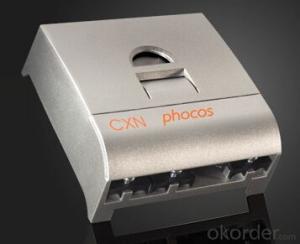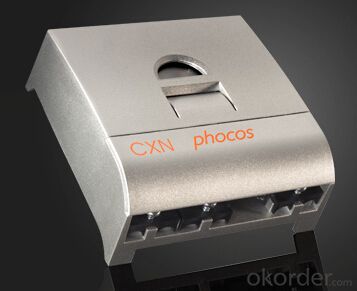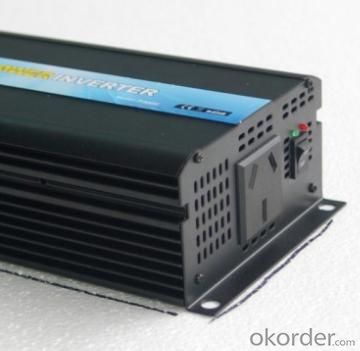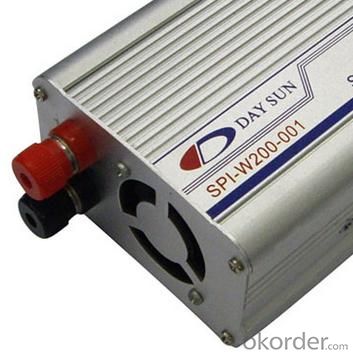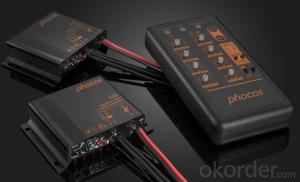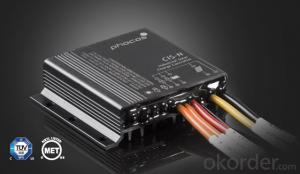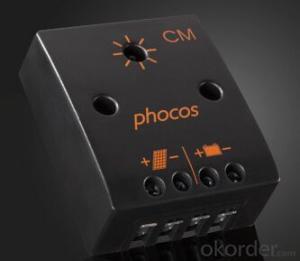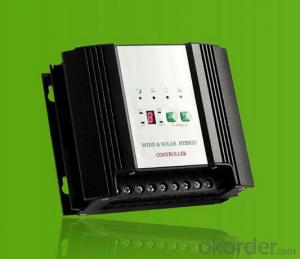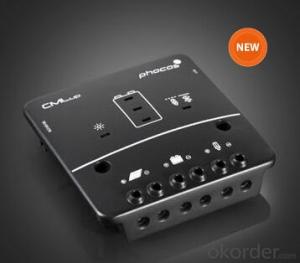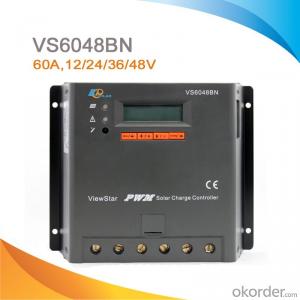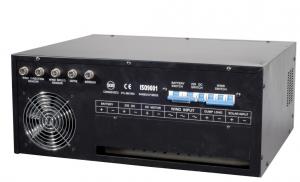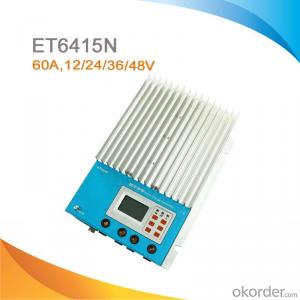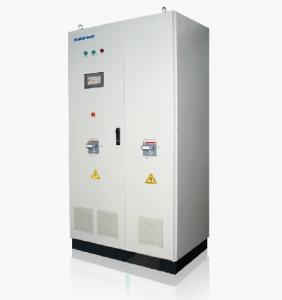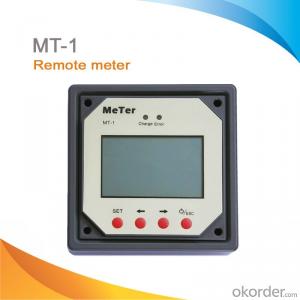Multiple Solar Charge Controllers - Solar CXN Series (10 – 40 A) Programmable Solar Charge Controller with Negative Grounding
- Loading Port:
- China Main Port
- Payment Terms:
- TT or LC
- Min Order Qty:
- -
- Supply Capability:
- 10000 unit/month
OKorder Service Pledge
OKorder Financial Service
You Might Also Like
1, Product desciption
The DC power for the inverter section can be derived from a normal AC wall outlet or some other source. Control and feedback circuitry is used to adjust the final output of the inverter section which will ultimately determine the speed of the motor operating under its mechanical load.
Motor speed control needs are numerous and include things like: industrial motor driven equipment, electric vehicles, rail transport systems, and power tools. (See related: variable-frequency drive ) Switching states are developed for positive, negative and zero voltages as per the patterns given in the switching Table.
The generated gate pulses are given to each switch in accordance with the developed pattern and thus the output is obtained.
2, Features of the product
Inverters convert low frequency main AC power to higher frequency for use in induction heating.
To do this, AC power is first rectified to provide DC power. The inverter then changes the DC power to high frequency AC power. Due to the reduction in the number of DC Sources employed, the structure becomes more reliable and the output voltage has higher resolution due to an increase in the number of steps so that the reference sinusoidal voltage can be better achieved.
This configuration has recently become very popular in AC power supply and adjustable speed drive applications. This new inverter can avoid extra clamping diodes or voltage balancing capacitors. There are three kinds of level shifted modulation techniques, namely
Is the electrical grid already nearby or would you need to call in the power company to bring in electrical lines.
If the electric needs to be brought to the area, how much is this going to cost? Depending on how far the grid electric is from the location of the needed lighting, this can be quite expensive.
How much lighting is needed on the street? Do the lights need to be dark sky compliant.
Do the street lights need to run from dusk to dawn or for only a specified number of hours at night.
Are the street lights able to dim in the middle of the night and still provide enough lighting.
These questions need to be answered before you can decide on how many lights you will need to complete the project.
3, Product Image
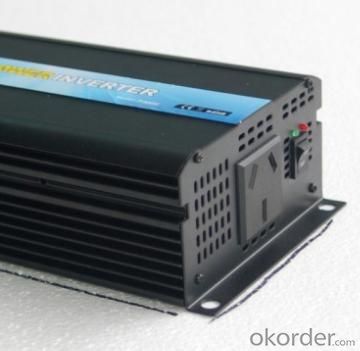
4, Detailed Specification
INPUT | |
Input voltage range | 185~265±5Vac |
OUTPUT | |
Output voltage range | 185~265±5Vac (AC mode) , 230Vac (DC mode) |
Output frequency (DC mode) | 50Hz (48~54Hz) or 60Hz(58~64Hz), same as AC(AC mode) 50Hz ±0.3Hz (DC mode) |
Wave form | Sine wave (DC Mode) |
Transfer time | 10ms. (Typical) |
BATTERY | |
Rated charging current (max.) | 45A |
Norminal DC input voltage | 12V |
Min. DC start voltage | 20V / 40V |
PHYSICAL | |
Unit dimension (mm) | 526*277*212 |
Master box dimension (mm) | 620*350*370 |
Net weight (1pc, kg) | 22.8 |
- Q: Can a solar controller be used with solar-powered air quality monitoring stations?
- Solar-powered air quality monitoring stations can benefit greatly from the use of a solar controller. This crucial component is responsible for regulating the flow of electricity from the solar panels to the monitoring station, while also preventing the batteries from becoming overcharged. By connecting the solar panels to the station's power system, the solar controller ensures a consistent supply of clean energy to power the various components, including the sensors and data loggers. As a result, these stations can continuously and sustainably monitor air quality without relying on grid power or frequent battery replacements. For optimal performance and reliable operation, it is highly recommended to incorporate a solar controller into solar-powered air quality monitoring stations.
- Q: Can a solar controller be used with a solar-powered outdoor advertising system?
- Indeed, a solar-powered outdoor advertising system can make use of a solar controller. In fact, the utilization of a solar controller is vital for a solar power system as it effectively manages the transfer of electricity from the solar panels to the advertising system. This essential component optimizes the charging procedure, prevents excessive charging or discharging of the batteries, and safeguards the system against potential harm due to voltage fluctuations. By incorporating a solar controller, the solar-powered outdoor advertising system can fully exploit and leverage the energy generated by the solar panels, guaranteeing consistent and effective functionality.
- Q: Can a solar controller be used with a solar-powered hydrogen production system?
- Yes, a solar controller can be used with a solar-powered hydrogen production system. A solar controller helps regulate and optimize the charging of batteries from solar panels, ensuring efficient energy conversion and storage. In a solar-powered hydrogen production system, the solar controller can be used to control the charging of batteries that store excess solar energy, which can later be used to power the electrolysis process for hydrogen production.
- Q: Can a solar controller be used with a solar-powered refrigerator?
- Yes, a solar controller can be used with a solar-powered refrigerator. A solar controller helps regulate the power flow from the solar panels to the refrigerator, ensuring optimal charging and preventing overcharging or damage to the battery. It also helps manage the power output during periods of low sunlight or high demand, maximizing the efficiency and performance of the refrigerator.
- Q: Can a solar controller be used in off-grid solar systems?
- Yes, a solar controller can be used in off-grid solar systems. In fact, it is an essential component of any off-grid solar system. A solar controller, also known as a charge controller, regulates the amount of charge going into the battery bank from the solar panels. It prevents overcharging of the batteries during periods of high solar input and protects the batteries from being completely drained during periods of low solar input. This helps to prolong the lifespan of the batteries and ensures their optimal performance. Additionally, solar controllers often have additional features such as load control and monitoring capabilities, making them an integral part of off-grid solar systems.
- Q: What is the standby power consumption of a solar controller?
- The standby power consumption of a solar controller is typically very low, ranging from a few milliwatts to a few watts. This low power consumption enables the solar controller to operate efficiently and effectively without drawing excessive energy from the solar panel system.
- Q: How do PWM solar controllers work?
- PWM (Pulse Width Modulation) solar controllers regulate the charging of batteries in solar power systems. They work by rapidly switching the solar panel's output on and off, creating a pulsating current that is then smoothed out and regulated to charge the batteries efficiently. This method ensures that the batteries are charged at an optimal rate, preventing overcharging and extending their lifespan.
- Q: How long does a solar controller typically last?
- A solar controller typically lasts for about 10 to 15 years, depending on the quality of the controller and how well it is maintained.
- Q: Can a solar controller be used in a solar-powered space elevator system?
- No, a solar controller cannot be used in a solar-powered space elevator system. A space elevator system requires a complex infrastructure of cables, counterweights, and a climber to transport payloads into space. Solar controllers are designed to regulate and control the flow of power from solar panels to batteries or electrical systems, typically used in applications like solar power generation for homes or vehicles. They are not designed to handle the unique and demanding requirements of a space elevator system.
- Q: Can a solar controller be used with solar water heating systems?
- Yes, a solar controller can be used with solar water heating systems. A solar controller helps regulate and optimize the operation of solar panels or collectors in a solar water heating system. It monitors and controls the temperature of the water in the system, ensuring efficient and effective use of solar energy for heating water.
Send your message to us
Multiple Solar Charge Controllers - Solar CXN Series (10 – 40 A) Programmable Solar Charge Controller with Negative Grounding
- Loading Port:
- China Main Port
- Payment Terms:
- TT or LC
- Min Order Qty:
- -
- Supply Capability:
- 10000 unit/month
OKorder Service Pledge
OKorder Financial Service
Similar products
Hot products
Hot Searches
Related keywords
